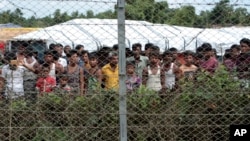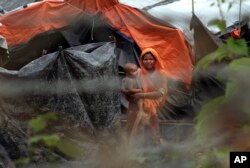More than 700,000 Rohingya fled to Bangladesh two years ago. They escaped military attacks in Myanmar. The country's armed forces were burning Rohingya villages, killing members of the communities and raping women and children.
The United Nations called the military campaign “genocide.” The world community reacted with aid and shelters for the stateless refugees in and around Cox’s Bazar in Bangladesh, Myanmar’s neighbor.
However, about 128,000 Rohingya and other displaced Muslims remain in the northern Rakhine State of Myanmar. They are kept in camps in Sittwe. They are the forgotten ones.
The government of Myanmar has blocked human rights groups and the press from entering the camps to investigate reported human rights abuses. VOA was able to speak to some people inside the camps.
Maw Mura is a 37-year-old Rohingya woman in Sittwe. She told VOA, “Living in the camp is like living in a prison or a chicken coop, it’s not appropriate for teenagers, married parents and elders to live inside a small room.”
Maw Mura has lived for seven years behind the sharp wire fences that surround the camps. She went there after armed local Buddhists burned down her house and village in 2012.
A few months after arriving, Maw Mura’s husband died, leaving her to raise their children alone. Her movement is restricted. She and her children share a one-room metal and wood shelter with another family.
“I want to go home,” Maw Mura told VOA.
The Myanmar government has begun building new housing nearby in order to “close” the camps. But to date, no Rohingya has been permitted to leave the area.
Dr. Win Myat Aye is Myanmar's Minister of Social Welfare, Relief and Resettlement. He says the Myanmar government is acting on a report made by former UN Secretary General Kofi Annan to bring peace back to Rakhine State.
But human rights groups say the government is only acting on some of the advisements listed in the report. And the Rohingya are being denied their most urgent request: citizenship.
Without a citizenship card, they cannot receive health care and education, open a business or return home.
Mohammad Noor also has lived inside the camps since 2012. He said, “It’s not OK to create a different kind of camp. Unless we are resettled in our original places, we will be separated forever.”
He compared the situation to that of Israel and the Palestinians. He said the groups were separated to benefit the Israeli government and powerful people.
Hla Hla is a mother of two children in the camp at Sittwe. She simply said, “We want to have a similar life again where our children have education and we have job opportunities.”
I’m Caty Weaver.
Editor's Note: The names of the Rohingya women have been changed to protect their identity.
VOA News reported this story. Hai Do adapted it for Learning English. Caty Weaver was the editor.
Write to us in the Comments Section or on our Facebook page.
_____________________________________________________________
Words in This Story
coop - n. a cage or small building in which chickens or small animals are kept
appropriate - adj. right or suited for some situation
original - adj. existing first or at the beginning
opportunity - n. chance






